- Home
- Carol Bruneau
A Circle on the Surface Page 23
A Circle on the Surface Read online
Page 23
“It’s ‘Mrs’ to you. You kids. Back in my day it was Missus and Mister. When I was your age—”
He worked to stifle a burp. He wanted nothing more now than to go upstairs, rinse out his mouth, and go to sleep. “If you’ve got something to tell us…?” He took a deep breath, focusing his gaze on her nose. It was oddly delicate for the rest of her face.
“Then I’ll be blunt. See here. You don’t need to be looking after two gals.” Her voice was grudging. “Word gets out, Enman Greene. You and your wife don’t owe nobody a thing.” Only then did he notice the mail in her lap. It must for Una? “What I mean to say is—oh, dammit, Lester says…well, here you go.” The envelope was yellowed and had a bit of peppermint or mothball stuck to it, which she plucked away before she pushed it at him. Her face was unusually pink; maybe it was simply the change of scene, the first time in years he had seen her anywhere but in the shop.
“Look. You’ve no good reason to feel beholden, man.” Her breath was uneven and seemed to come a little too fast, as if the act of speaking might strangle her.
“I’m sorry—?”
“I don’t need to explain the volume of personal news”—“noose,” she called it—“that passes regular through my place. Now and then the odd item goes astray, hardly my fault. Better late than never, I guess.” She shrugged, then gave a shiver and a nasty little laugh. He could almost feel Lester’s bony finger pressing into the centre of his back, the time he’d pinched a humbug—four years old and thinking how clever he was flirting with danger, defying the law, getting away with it. A single stale candy. Not worth a lick of sugar when the old man found out and told Ma, and Ma took the wooden spoon to him, and supper was mustard on bread.
“Lester had a soft spot for you kids. On account of not having his own.” Iris stared at Ma’s mat where Tippy had picked at the roses hooked into it. Despite his wooziness, and realizing how his breath must reek, he bit back a smile. God only knew what else Lester told her, kept on telling her.
“I guess it comes with age, does it? Having youngsters ignore you. Worse, them thinking you’ve nothing intelligent to say. I’m old but I’m not stupid.
“Go on, open the letter,” she urged. “I have reason to believe, uh, that the one your pa knew, that other Twomey,”—she picked something from her sleeve, the petrified crumbs of an earlier meal—“well, let’s make it crystal clear: got herself pregnant down the States, then came home to have it. Her baby, I mean.”
Iris’s throat-clearing was the kind usually saved for what she called tire-kickers, people who wanted to look but not buy her merchandise, loath to spend their money. But now she’d got talking she could not stop. “Listen to me,” she said loudly enough to rule out any hint of glee. “You have it from the horse’s mouth. Sue me if you want. But I swear it was just, well, interest in my fellow man that prompted—made me peek.”
She gulped to catch her breath. He wondered if she needed a glass of water.
“Seventeen, eighteen years, that’s a long time ago,” Iris continued, “at least it is for you young ones. Water under the wharf. But the upshot is, you don’t owe Hannah Twomey a thing; her uncle neither, you don’t owe either of them a proper rat’s ass.” With that, she struggled to her feet.
“But…the old man travelled down to Boston. He’s the father. But that’s not the point. The point is—” His voice was thick and he felt faint. “Makes no difference who the father was, she deserves better than what she’s got.” The whiskey hadn’t finished with him. If he didn’t race upstairs he might be sick right here.
“Well you’re nothing but your ma’s son—a sucker for punishment. If you don’t want to read it, hand it back. You won’t be holding a grudge, I hope, taking matters to the Post Office.”
A shaky smile flitted over her face and he glimpsed, perhaps, the enterprising girl whom Cleary had supposedly been keen on before Ma got him to the altar. Long before he himself was a glint of possibility in the old man’s eye.
What could he do but shake his head, throat clenched, and say of course he wouldn’t?
“Well, you might be foolish as the birds, but you’re decent. She did a good job raising you, your ma. But if you don’t mind me saying, you’d be smart to cut out the sauce. Look at the grief it caused your dad, treating liquor like his best friend. The kind of friend that tricks you into thinking shit is chocolate.” She looked to be sweating now, her cardigan as bulky as a sheep. Sweating with relief, maybe. “Well that’s it then. What they say about him knocking up Cecelia Twomey is a load. You heard it here and I’ve got Lester to vouch for me.” She eyed him with a look of expectation, as if a reward of tea and cake might be in order, or an extra-celebratory cup of Ovaltine.
“Lester always said you and your ma would be better off knowing the truth. He and your dad grew to be buds, but why your ma never took a shine to me, who knows. Her and I were polite enough, just never quite hit it off. I’d of taken up with Cleary myself if not for his fondness for…Marge knew it too, maybe she was jealous? Water under the bridge,” she sniffed, gathering herself. “But then along came that prime piece of merchandise, my Lester, all the swagger a gal could want and—”
“Lester was a good fellow,” he managed.
“Cleary too, in his own way. Don’t you forget it. Now you’re taking your time opening that damn letter. So I’ll tell you plain and simple, it was a Meade that did it.” Enman gawped at her and she gawped back, as if he was dim. “Lester seen him and Cecelia going at it out back of Twomey’s shed. Sylvester moving like he was sawing—”
“Sylvester Meade? You’re saying….” His gorge pooled with spit; at least he could breathe through it, scared to swallow it back. “Least I can do is run you home,” he said helplessly, though she was looking lighter on her feet. A decided swing to her arms as she shuffled to the door. “Sylvester Meade,” he marvelled, shaking his head.
“Land, is it true your car got drove by Nazis? Riff-raff joyriders. Imagine.”
He swallowed, holding back the taste of bile. “I guess, if that’s what they’re saying. Iris,”—she’d reached the doormat, was headed for the steps—“is there other mail I should know about?” She was keen to make a getaway, clearly, freed of whatever if any guilt she had hauled around. Guilt, perhaps, for whatever injury her silence all these years might have caused Ma. “Anything for my wife?”
“You’d be the first I’d tell, Enman Greene. Abysinnia—I’ll be seeing ya—like Lester says.”
As he shut the door, the nausea lifted sufficiently for him to slouch back in and flop down on the couch. He was too beat to lift a finger, even to turn off the radio. He never did make it up to bed, staying put to sleep it off.
“You flattened Barton Twomey? Enman Greene, what in the name of God’s got into you? You can’t just move her in here.” It was Una standing there in the dimness—late afternoon or early evening, who could tell? She reached for something, the note he had let slip to the mat. Coming to, he felt his heart beating. It was as though he’d never thought to listen to it before.
Cradling his head, he lay as still as possible. “I could ask the same of you.”
The weak, staticky jags of someone’s singing reeled in and out from the station in Boston. By some fluke it had come in loud and clear earlier, when he’d staggered in to meet his visitor. Still, music was the best medicine besides drink for calming him, even if the record sounded like it was being played at sea, the airwaves catching every roller.
“One minute you’re defending the girl, Una. The next you want Hannah gone.”
Wiping her hands on her skirt, Una unfolded Mrs. Finck’s offering and read it. He gazed at the water stain overhead. Its fern-like fronds mimicked frost, their lushness heralding a leaky pipe, either from some past plumbing disaster he could not account for, or an imminent one. “Oh my,” she kept saying, reading Cecelia Twomey’s fawning apology for lying, for keeping his father in the dark a
bout “Sly.” She knelt to take Enman’s hand. Hers felt sticky-warm and damp. “I’m sure whatever you did, Twomey had it coming.” Her voice trailed off, then gathered steam. “But Hannah’s not our responsibility.”
The singing switched to piano music—choppy, crackling chords that substituted for anything he might have uttered in response. A mercy to his throbbing head that it wasn’t one of the Russian’s swaying, crashing symphonies, their dissonance and strange harmonies.
“Enman!” Una’s eyes were bluer than blue, angry. Her whole appearance had sharpened. Every line, every wrinkle in her face that the sun hadn’t tinted appeared more deeply etched; even her wiry hair fought to resist the wallpaper’s faded look.
“If there’s no returning her, since you moved her in, Enman, you’ll be the one tending her.” Una spoke like a principal. “Imagine, the three of us crammed in here.” She made it sound as if the place were no bigger than a fish store and derelict, and cast her gaze around the room. Now that the drought was over, he imagined her fretting about the damp suddenly eating plaster and wood, and mould taking over. From the kitchen came a jubilant voice, Hannah reciting times tables. Ten times ten times ten equals a thousand. The easiest thing in the world, of course, adding zeroes.
“Mrs. Finck should hire her.” Una’s voice was impatient.
“The world’s got enough grief, why add to it?” It had enough grief to blow itself to kingdom come. What was the point, he wondered, of lighting fuses? “Una, we can’t go back on something we started. It’s like burning a ledger when you don’t like what’s written inside. You start a fresh page, hope for the best. In the red or in the black, you carry on.” And you keep carrying on until you arrive at the last set of figures, while only guessing at what they will reveal, he thought. The trick was staying level, maintaining calm despite whatever downturns loomed there. To be glad of the pages themselves. “I guess we all have to find our own happiness.” It wasn’t quite what he wanted to say.
“God. You would find it under a rock or a black-spotted weed.”
“Weeds, rocks—they all count.” Reaching for her hand, he thought of the naming of objects, how words were even more inadequate than numbers in describing the completeness of any one thing. All they gave was its approximation.
Her eyes had a pleading look. She traced his knuckles with her finger. “Look at you. Sure you didn’t slug a wall?”
“My one regret is that I didn’t belt him harder.”
She might have laughed, it would have helped if she’d laughed, but instead she smiled wanly. “Takes two to tangle, doesn’t it.”
There was a burr behind his eyes—“Don’t we know it”—a scratchy irritation which he blinked back. Tears brightened Una’s. She tried to fan them away with the letter. Grabbing the letter, he made a paper airplane of it and aimed it at the desk.
“Hannah’s not going anywhere, she’s staying. If Twomey comes to lay me out, he lays me out. I won’t be surprised.”
“Enough of surprises.”
He just shrugged. It might have been the Lindy hop executed by one partner with two left feet, the way they danced around everything. Neither seemed able to take the lead or step out, until finally Una spoke.
“I’ve been stupid, okay?” She said it almost too quietly to hear. “Enman. Can we not be strangers to each other?”
Even in crackly snatches the music riding the airwaves from Boston offered its assurances of harmony. Sober at last, Enman lay there long after she had escaped upstairs. A sonata—smoother and more even-keeled than a ballet, with its wild mood swings and elevated hopes. Then a symphony. Chaos, catastrophe, and swirling bombast, melodies not working out as they ought—to his ear, at least. Hubley Hill would have hated it. His poor old violin was propped in its case against the desk, all but forgotten—as forgotten as after Cleary had given it to him a few months before he died. An atonement, maybe, for the ’cordine, as Lester had called it. While giving up drinking, Enman had taken lessons from a fellow in town. Now the thing might well sit there and rot.
Given his lack of practice time, he would never be able to play as he hoped to, Hubley’s music as hard to execute as classical. What made a piece pleasing was all in the hands of the player. The chops to start and stop on a dime, to tease out sounds as pure as they sounded on records—it demanded a child’s willingness to struggle along, delighted simply at the wonder of ekeing out notes, never mind rhythm and melody. And yes, discordant as it was, the blaring symphony had an order.
In the midst of its final movement Hannah tiptoed in. Through slitted eyes he watched her fingering everything in sight: Ma’s lace runner, the doodads on the shelf, though she avoided the damaged one. Then she went for the radio’s knobs, and things strewn across the desktop. Someone else might have told her to stop. But her curiosity cheered him, and the pains she took picking up and straightening his pencils. Unearthing something from under his books, she laid it aside to pet then chase out the cat. He heard her moving about the kitchen, heard Una shifting something overhead.
When the station cut out completely he rose to tune in another. “Bewitched, Bothered and Bewildered” floated in on the airwaves, then “White Cliffs of Dover.” Vera Lynn’s crooning offered a chipper, melancholy peace until Hannah went thumping upstairs. Her lilting voice and Una’s travelled down, weaving in and out of the song, such a sad one about parting. He strained to hear what they were saying: it was like introducing a new cat to an old one, the newcomer had to stake its territory. Hannah’s humming filtered down. He couldn’t tell if they were arguing, but if they were he owed it to both to play referee.
Reluctantly he ventured upstairs, hovered on the landing. The lyrics drifted up, then “Lily Marlene” came on. Funny you never heard songs about divorce, the word pressed between his thoughts like a dried leaf. They were transforming his old room into one for Hannah. Una looked up from the carton she was dragging into their bedroom. “Let’s make sure you’re comfortable.” Her voice was full of mock cheer.
He patted Hannah’s shoulder, lifted another of Una’s boxes from his old bed.
“It’s not as though we need the room for guests. Unless your friend comes to visit, in which case Hannah won’t mind taking the couch—will you?”
The chances of needing it for a nursery didn’t seem too pressing as Una kept slightly aloof, busily hanging up things of Ma’s on hangers she’d pulled from their closet. He didn’t suppose Hannah would mind her closet lacking the height to properly hang a coat or dress. He did not need to say “Make yourself at home” as Hannah flounced upon the bed, arms flung wide to gauge its width. He thought at first she was grinning. Her cheeks blazed, her bottom lip quaked, and she shook her head.
“Maybe I’m dead, Mister. Maybe this is that place Missus Goodroad says we goes, after.”
“The pearly place.” Una shot him a glance, one of amusement. He didn’t know what to say.
“Thank you, Mister.”
“Don’t thank me, thank Una, I mean, Mrs. Greene.” Because already Una was coming around, her flash-freeze having melted, thank God. Her moods were more changeable than weather. He wondered if in other marriages moodiness could become grounds for divorce.
Downstairs, atop Inkpens’ ledgers, lay this year’s seed catalogue, dropped there by Hannah. Easier to contemplate than any couples he knew divorcing was the idea of a hard, sudden frost. Even a freakishly early one carried spring’s hope of revival, at least.
Was it the wisdom of plants people lacked, the gift plants possessed for striving towards light?
All silent upstairs, as night fell he pored over the catalogue. Ignoring Ma’s selections, he circled new ones, foolproof things like crocuses—crocuses for cuckolds—which he’d plant for whomever was around come spring. He wanted something to look forward to. He would not be sorry to see the tail end of this summer, barely a seed pod to redeem it. But the past is past and tomorrow looks aft
er itself, he recalled the old man saying, whether while in his cups or not, it didn’t matter. Unless the winter brought exceptionally bitter cold and no snow, plants generally came back. Brown-eyed Susans, for instance, hoarding the heat of a drought to bloom by the ditch when others failed. Phlox, too, the mauve stuff whose leaves mildewed white in a summer of rain but bloomed till November. Planted a lifetime ago, Ma’s still came up by the lane.
“We’ll Meet Again” lofted him into the wee hours. Finally, switching off the radio, he listened hard for the sounds of Una and Hannah sleeping upstairs, and burrowed into the cushions. The sofa’s springs were like a web of cysts, their mothball smell as engrained in the upholstery as his and Ma’s past.
In his mind’s eye, dim balls of light—her face and Cleary’s—threw off shadowy sparks, then retreated along separate vacant pathways—Ma’s into the furthest, deepest crannies of the house, the old man’s through and beyond the barrens—until Enman could no longer picture either one. Their loss was sadder to him than Una’s ever could be, actually. But it was a cold comfort, realizing this.
The door to the little room was ajar, the burble of Hannah’s snore as regular as a metronome. Above his childhood bed loomed a dark little picture—that girly one of a boy in blue. Maybe Hannah had wanted it, amused by the boy’s princely getup? She was too old for dolls, too old to be treated like a kid. Yet, tucked in, despite Ma’s nightgown showing where the covers dipped, she looked like one. A strange and strangely beautiful half-child, she looked eerily at home—as much at home, he decided, as any of us can be.
In the other room Una lay so still it stopped his heart, her face in a greyish band of moonlight. He paused at the threshold—better me than Gainsborough’s little prince watching over you, he thought, as he slid carefully between the sheets.
Moving next to his wife, he took pains not to let his skin touch hers. Every part of him ached for it, though, ached for the feel of her, for things to be all right, if not as they had been.

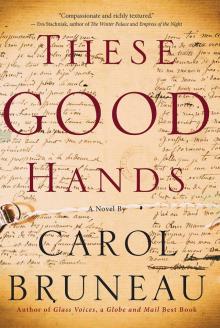 These Good Hands
These Good Hands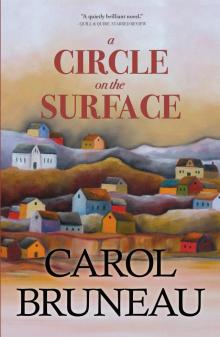 A Circle on the Surface
A Circle on the Surface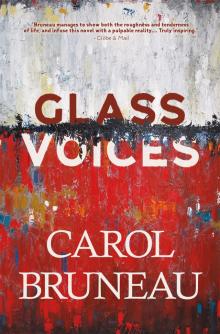 Glass Voices
Glass Voices Berth
Berth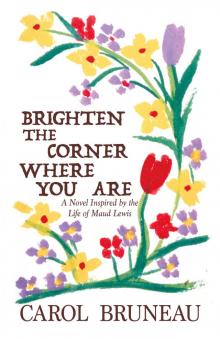 Brighten the Corner Where You Are
Brighten the Corner Where You Are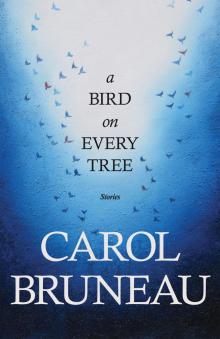 A bird on every tree
A bird on every tree